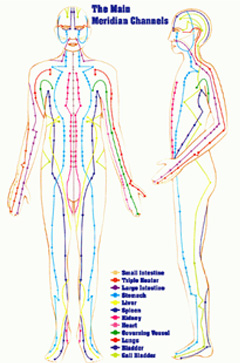THE TWELVE MAIN MERIDIANS
The body has twelve main pairs of main meridians that flow each side of the body as well as two specific meridians known as vessels. Each meridian is named after an organ or function. These twelve meridians correspond to each organ. Five are ascending yin pathways and six are descending yang pathways. Lung Meridian is the intake of Qi energy from the air for use by the body. It also is for building up resistance against any external intrusions. It has an ascending yin pathway. The lungs regulate respiration and are therefore responsible for the chi of the entire body. Problems associated with this meridian are respiratory diseases, sore throat, cough, common cold, and pain in the shoulder and along the meridian.
Lung Meridian is the intake of Qi energy from the air for use by the body. It also is for building up resistance against any external intrusions. It has an ascending yin pathway. The lungs regulate respiration and are therefore responsible for the chi of the entire body. Problems associated with this meridian are respiratory diseases, sore throat, cough, common cold, and pain in the shoulder and along the meridian.
Large Intestine Meridian is involved in the function of the lung, and secretes and excretes from inside and outside the body. It also eliminates the stagnation of Qi energy. It has an ascending yin pathway. Problems associated with this meridian are abdominal pain, constipation, diarrhea, sore throat, toothache in the lower gum, nasal discharge and bleeding, pain along the course of the meridian.
Spleen Meridian is involved in digestion and the process of fermentation. It has an ascending yin pathway. It is the crucial link in the why food is processed. Emotional problems are also related to this meridian, for example: depression, PMS, irritability and concentration problems. Problems associated with this meridian are the spleen and pancreas, abdominal distension, jaundice, general weakness and sluggishness, tongue problems, vomiting, pain and swellings along the course of the meridian.
Stomach Meridian is involved in the sinuses, throat, lungs, diaphragm, spleen, liver, gall bladder, stomach, pancreas, duodenum, adrenal glands, kidneys, large intestines, small intestines, and pelvic region; also the appetite and digestion. It has a descending yang pathway. Problems associated with this meridian are stomach problems, abdominal pain, distension, edema, vomiting, sore throat, facial paralysis, upper gum toothache, nose bleeding, and pain along the meridian.
Heart Meridian represents compassion and thus governs emotions and the spirit. It is also responsible for the circulation of the blood and the total body through the brain and the five senses. It has a descending yang pathway. The heart and small intestine meridians are coupled. The heart meridian gets its chi from the spleen meridian and in turn passes it to the small intestine meridian. If the heart meridian is strong and healthy, the emotions will be balanced. Problems associated with this meridian are heart problems, dryness of the throat, jaundice, pain along the course of the meridian.
Small Intestine Meridian governs the total body through the displacement and digestion of food. Anxiety, anger, nervous shock, and emotional excitement can affect the circulation of the blood, and the small intestine can actually cause blood stagnation that affects the body as a whole. It has a descending yang pathway. Problems associated with this meridian are pain in the lower abdomen, sore throat, swelling, or paralysis of face, deafness, pain along the meridian.
Kidney Meridian controls the spirit and energy to the body and governs resistance against mental stress by controlling hormone secretions. It also detoxifies and purifies the blood. It has an ascending yin pathway. Problems associated with this meridian are kidney problems, lung problems, dry tongue, lumbago, edema, constipation, diarrhea, pain and weakness along the course of the meridian.
Bladder Meridian is related to the mid-brain, which cooperates with the kidney system and the pituitary gland. It is also connected to the autonomic nervous system related to the reproductive and urinary organs. It has a descending yang pathway. Problems associated with this meridian are bladder problems, headache, eye diseases, neck/back problems, pain along the back of the leg.
The Heart Constrictor (Pericardium) Meridian acts as a supplemental function of the heart related to the circulatory system, which includes the heart sac, the cardiac arteries, and the system of arteries and veins. It is also responsible for total nutrition. It has an ascending yin pathway. Problems associated with this meridian are heart problems, dryness of the throat, jaundice, pain along the course of the meridian.
Gland or Triple Heater Meridian acts as a supplemental function of the small intestine, and controls the visceral organs that circulate energy to the entire body. It also protects the function of the lymphatic system. The upper heat is related to the chest, the middle heat to the solar plexus, and the heat above the navel and below is related to the peritoneum, as well as circulation to the extremities. It has a descending yang pathway. Problems associated with this meridian are diseases of the thyroid and adrenal glands, ear problems, sore throat, abdominal distension, edema, swelling of cheek, pain along the meridian.
The Liver Meridian stores nutrients and energy for physical activities. It has an internal branch, which runs through the throat and affects the thyroid. It also helps resists against disease and supplies, analyses and detoxifies blood in order to maintain physical energy. It has an ascending yin pathway. Problems associated with this meridian are liver problems, lumbago, vomiting, hernia, urination problems, pain in the lower abdomen and along the course of the meridian.
The Gall Bladder Meridian distributes nutrients throughout the body and balances the total energy through the help of internal hormones and secretions include bile, saliva, gastric acid, insulin, and intestinal hormones. The gall-bladder meridian penetrates the lung, liver, gall bladder, spleen, large intestine, and hip area. It has a descending yang pathway. Problems associated with this meridian are gall bladder problems, ear diseases, migraine, hip problems, dizziness, pain along the meridian.
The two addition meridians listed below are often included in meridians charts to make a total of fourteen. They are part of the “extraordinary” meridians that are different from the twelve organ meridians as they are considered storage vessels or reservoirs of energy and not associated directly with the internal organs. They have been referred to as being part of the "Spiritual Axis".
The Central Meridian or Conceptual Vessel is a yin channel. It has a governing effect on all other yin meridians and organs. It is located at the base of the sternum. It is very important for the overall well-being of the body. Problems associated with this meridian are diseases of the genital system, hernia, cough, breathing difficulties, breast problems.
The Governing Meridian or Yang Vessel is a yang channel. It has a governing effect on all the other yang meridians and organs. It is located right at the crown of the head. It is a unique connecting point for all yang meridians. Problems associated with this meridian are spinal problems, mental disorders, fever, nose problems, and headaches.





